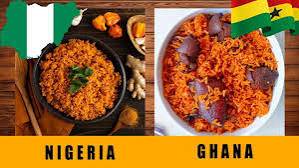The Long Food Battle: Ghana Jollof vs. Nigeria Jollof
The debate over which country produces the best Jollof rice—Ghana or Nigeria—has become one of West Africa's most passionate culinary rivalries. Jollof rice, a one-pot dish made with rice, tomatoes, onions, and various spices, is a staple in both countries, but each has its unique twist that fans vehemently defend.
Historical Context
The origins of Jollof rice can be traced back to the Senegambian region, where it is believed to have emerged from the Wolof people. The dish was adapted by various West African nations, each incorporating local ingredients and cooking methods. As Ghana and Nigeria have grown into two of the most influential culinary hubs in Africa, their versions of Jollof have gained significant cultural importance and a strong following.
Ingredients and Preparation
One of the key differences lies in the preparation and ingredients. Nigerian Jollof rice typically features long-grain rice cooked in a tomato sauce that includes bell peppers, onions, and a blend of spices. The cooking process often involves frying the base sauce before adding the rice, which results in a rich, smoky flavor. Many Nigerians also advocate for the addition of protein, such as chicken or beef, cooked in the sauce to enhance the dish's overall taste.
In contrast, Ghanaian Jollof often uses basmati rice, which tends to be fluffier and has a slightly different texture. The Ghanaians also emphasize the importance of the “party rice†method, where the rice is cooked in a large pot over an open flame, creating a distinct smoky flavor. Ghanaian recipes may also include additional spices, giving it a slightly different profile that many fans appreciate.
Cultural Significance
Beyond mere taste, Jollof rice holds a deep cultural significance in both nations. It is a dish of celebration, often served at weddings, parties, and family gatherings. The competition for the title of "best Jollof" has even sparked events like the annual Jollof Festival, where chefs showcase their skills and compete for the ultimate bragging rights.
Social media has amplified this rivalry, with platforms like Twitter and Instagram filled with spirited discussions and humorous posts about the two versions. Memes and challenges often pit the two countries against each other, making it not just a culinary debate but a matter of national pride.
The Taste Test
The best way to settle this dispute might be through a taste test, but opinions remain split. Supporters of Nigerian Jollof praise its robust, spicy flavor and the texture of the rice, often describing it as hearty and filling. Meanwhile, fans of Ghanaian Jollof argue that the distinct smokiness and fluffy texture provide a superior dining experience.
Ultimately, personal preference plays a significant role in determining which version is "better." For many, it comes down to familial ties and cultural background—those raised on Ghanaian Jollof may prefer its flavor, while those from Nigeria will likely champion their own.
Conclusion
The Jollof rice debate between Ghana and Nigeria showcases the rich culinary diversity of West Africa. While each version has its unique appeal, the real beauty lies in the cultural exchange and appreciation for each other's cuisine. Instead of viewing it as a competition, it might be better to embrace the differences and enjoy both versions of this beloved dish. After all, food is meant to bring people together, and Jollof rice serves as a perfect example of that shared love across borders.


